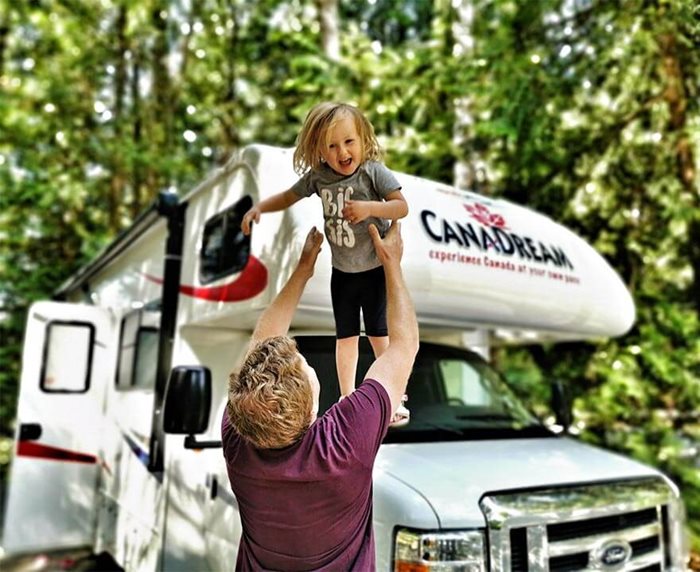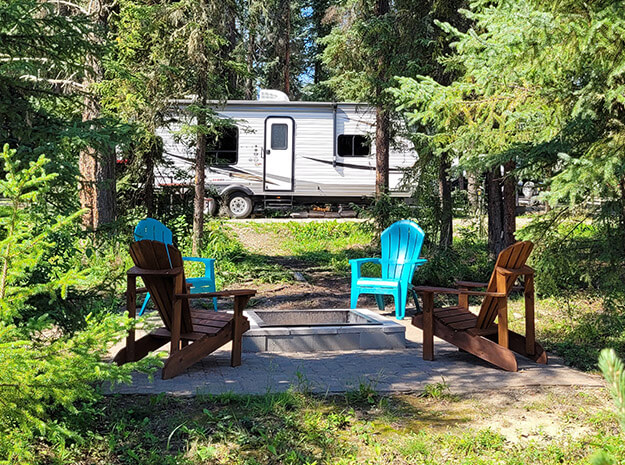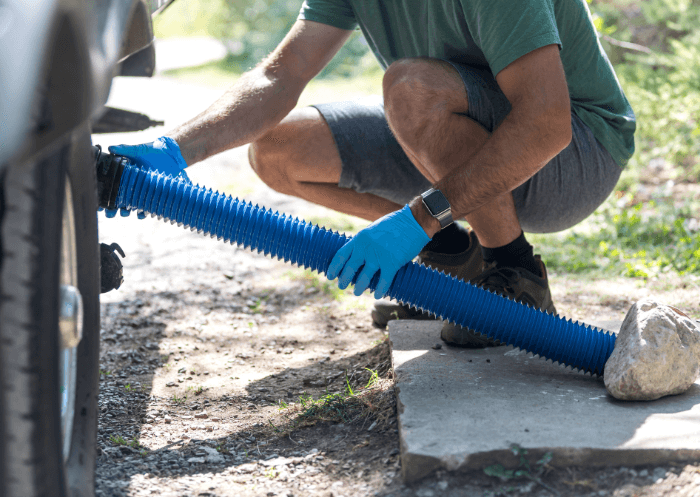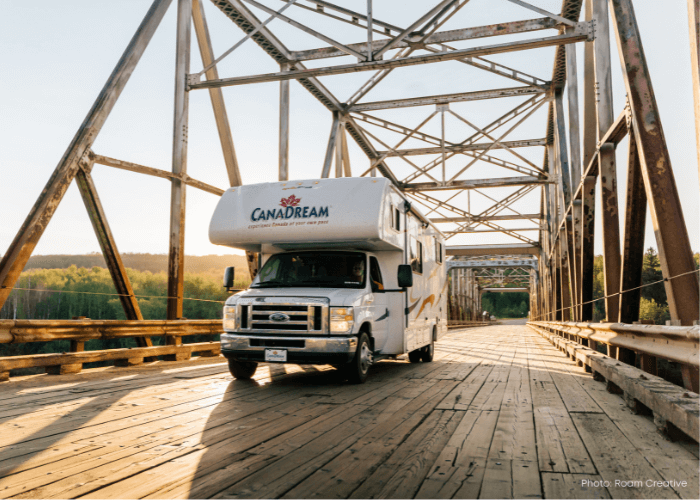RV travel is a great way to explore the beauty of nature, but it has also been criticized for its impact on the environment. But don't be discouraged, as there are a multitude of ways to implement eco-friendly measures while you adventure in your RV!
Sustainable RV tourism focuses on travelling in an eco-friendly way by reducing environmental impact while still enjoying the pleasures of this popular mode of vacation travel.
In this blog, we will discuss RV travel's impact on the environment and offer sustainable tourism options aimed at reducing your carbon footprint while you explore Canada in your home on wheels. Next, we address sustainable practices for RVing and share with you several top destinations for sustainable RV tourism in Canada that are guaranteed memory makers! Finally, we have compiled a list of eco-friendly tips to enhance your sustainable RV vacation journey.
Get ready to embark on a fulfilling and environmentally responsible RV adventure!
RV Travel's Impact on the Environment
RV travel is beginning to shift its environmental footprint. Yes, any combustion engine creates an emission toll that we’d all like to see reduced in the future but, until electrification or other synthetic fuel is widely available across North America, we have limited options vehicle-wise for reducing an RV's impact on the environment.
Selecting an RV from a leading RV Rental company will help to minimize the footprint, as the more modern the RV, the lower the emissions. Engines have been improving over the years and modern RVs tend to have solar panels fitted to help boost battery power, along with improved insulation against warm and cold weather.
Additionally, it's imperative to consider our choices and actions while on the road. By practicing conscious travel habits, like driving shorter distances, driving slower to burn less fuel, staying at campsites where you can practice safe camping, reducing waste and supporting local businesses, we can contribute to sustainable travel and minimize our carbon footprint.

What is Sustainable RV Tourism?
Sustainable RV tourism involves conscious efforts to reduce the environmental impact of travel. Eco-friendly camping practices can be adopted to minimize environmental impact such as choosing motorhomes with solar panels and eco-friendly appliances to embracing leave-no-trace camping practices.
Importance of practicing "Leave No Trace" principles
Achieving a responsible camping lifestyle involves adopting ‘Leave No Trace’ principles which are essential for minimizing environmental impact of RV travel. This includes:
- Proper waste disposal into appropriate trash and recycle bins. This ensures we are doing our part to care for our physical spaces and our wildlife’s health and safety; both pivotal factors in safeguarding our Canadian wilderness, guaranteeing it will be preserved for years to come.
- Putting out your campfire completely by pouring water over every ember. Stir the complete fire pit base with a stick and continually pour water over the fire pit again and stir. Continue to do so until smoke ceases to rise.
- When leaving your campsite or area, it should appear cleaner than when you arrived ensuring bottles and cans, plastic bags and filled dog bags, bottle caps, cigarette butts and any ‘man-made’ items are taken with you and disposed of properly in bins. Fire pits should be absent of garbage as this is litter as well as an attractant for wild animals, which place them in harm’s way.

How can I reduce my Carbon Footprint while Traveling?
Opting for renewable energy sources is an effective way to reduce your carbon footprint and practice sustainable RV tourism while travelling in a motorhome. Another way to minimize your impact on the environment is by practicing responsible waste management. Ensure you dispose of trash and sewage properly and use biodegradable cleaning products to avoid harmful chemicals polluting the environment. By taking these small steps, you can enjoy sustainable RV tourism while minimizing your environmental impact.
Making the modern choice
While there is an appeal to travelling in retro motorhomes and campers, they tend to be the most eco-unfriendly modes of transport. Choosing RVs with modern engines, appliances and other eco-friendly components will help to reduce your carbon footprint. Indeed, with solar panels on the roof of your motorhome, you can power your electrical devices and appliances without relying on fossil fuels.

Ways to Minimize Fuel Consumption
Minimizing fuel consumption is an essential aspect of sustainable RV tourism. By implementing eco-friendly practices, travellers can reduce their carbon footprint and contribute to a healthier environment. Planning your route to avoid heavy traffic areas and unnecessary detours is an effective way to reduce fuel consumption. Routine maintenance of your motorhome can also improve fuel efficiency.
Importance of Proper Waste Management
It is imperative to dispose of waste responsibly in designated dump stations. Refrain from dumping waste in natural areas as it pollutes the environment and harms wildlife. Additionally, composting toilets and greywater systems can help minimize the amount of waste generated by RVers.

Waste Reduction
Reduce waste by using reusable dishes and utensils instead of utilizing disposable products, seek out eco-friendly cleaning products, and minimize water usage. These small actions all add up and help to reduce your carbon footprint as well as those around you! Your small campers are watching you and will adopt the same camping practices you employ.

Sustainable Practices for Camping
When it comes to sustainable camping, making conscious choices about where you park your RV can make a big difference. Look for a campground that prioritizes environmentally-friendly practices such as using renewable energy sources and minimizing water waste. CanaDream works with campground partners who practice sustainable camping by providing facilities which reduce their impact on the environment. Once you've arrived at your destination, conserve water by taking shorter showers and using low-flow fixtures. Be sure to pack reusable containers and bags to minimize waste and take advantage of alternative modes of transportation like biking, shuttles or walking once you're settled in!
Use of Eco-Friendly Cleaning Products
It's important to consider the impact of our cleaning products, often containing harmful chemicals, on the environment. Using eco-friendly cleaning products made from natural ingredients, like the EPA does, is a simple way to reduce our carbon footprint and preserve nature.

Supporting Local Businesses
Shop Local - by purchasing goods from the surrounding community, we reduce our carbon emissions and support the local economy. Visiting farmer's markets and buying locally sourced produce is an excellent way to connect with the community and reduce our impact on the environment. Additionally, participating in eco-friendly activities and attractions such as biking or hiking trips are ‘carbon footprint friendlier’ ways for us to explore our environment and support local businesses.

Water and Energy Conservation Tips
Practice energy efficiency by Implementing small changes like taking shorter showers, using low-flow faucets and toilets, and recycling greywater which can significantly reduce water consumption. Additionally, using LED lights, solar panels, and batteries can help campers minimize their energy consumption and dependence on generators. Regular maintenance of plumbing systems prevents leaks and reduces water waste. Challenge yourself to restrict single-use plastics and instead, pack reusable water bottles and water jugs.
Top Destinations for Sustainable RV Tourism in Canada
Introducing sustainable practices to RV travel doesn't mean sacrificing the adventure. In fact, some of the top sustainable destinations in Canada offer unforgettable experiences while reducing your environmental impact. Consider exploring national parks that have implemented sustainability measures and offer all types of camping options. Alternatively, choose a provincial or privately owned eco-friendly campground from the Pacific to the Atlantic that prioritizes renewable energy sources and waste reduction. By choosing such destinations, you can enjoy a guilt-free vacation while preserving the beauty of our planet.
National Parks and Provincial Parks
National Parks, and Provincial Parks offer some of the best destinations for sustainable RV tourism. These protected areas not only provide opportunities to experience nature's beauty but also allow visitors to learn about conservation efforts. Additionally, educational programs and volunteer opportunities are available at these locations for visitors interested in contributing to conservation efforts. By choosing sustainable RV tourism destinations, travellers can enjoy the great outdoors while minimizing their impact on the environment.

Scenic Byways and Off-Grid Trails
Exploring scenic byways and off-grid trails is an excellent way to escape the crowds and connect with nature. These destinations offer a unique opportunity for sustainable RV travel, providing stunning views while minimizing the impact on the environment. RVers can enjoy hiking, biking, and other outdoor activities while exploring these areas. By travelling off the beaten path, RVers can also support local economies and reduce their carbon footprint. However, it's important to plan ahead and research these destinations to ensure a safe and responsible trip.

Handy Tips for Sustainable RV Tourism
- When packing for an eco-friendly adventure in a recreational vehicle, it's essential to consider reusable items such as water bottles and food containers. This not only reduces waste but also saves money in the long run.
- Opt for biodegradable cleaning products to avoid polluting the environment while washing dishes or cleaning your RV. Plan your route ahead of time to reduce driving time and fuel consumption.
- Research eco-friendly campgrounds that prioritize sustainable practices like recycling and energy conservation before booking your next RV adventure.
- CanaDream RVs all feature solar panels. Park your RV in a spot where the solar panel gets lots of sunshine to help boost the solar power in your RV.
- Use energy efficient appliances in your RV.
Resources for Planning and Booking Your Sustainable RV Road Trip
When planning your sustainable RV trip, it's crucial to choose resources that prioritize eco-friendly options. Several online resources cater to green travel enthusiasts and offer tips for eco-friendly camping, sustainable activities, and low-impact travel. Websites like EcoTourism.org provide valuable information on eco-conscious travel and suggest campgrounds that prioritize environmental conservation.
Conclusion
RV travel is changing and over the course of the next decade and we are going to see many more positive improvements. By practicing sustainable RV tourism, you can enjoy all the benefits of RV travel while minimizing your environmental impact.
Planning ahead, choosing renewable energy sources, and practicing ‘Leave No Trace’ principles can help reduce the ecological footprint on your Canadian adventure while also supporting local communities. By using these resources, you can plan an unforgettable journey that safeguards the planet for generations to come.
Ready to plan your next adventure in sustainable RV tourism but don't have your own RV? CanaDream can help! CanaDream works with RV manufacturers who are Certified Green. These manufacturers have shown a commitment to utilizing eco-friendly practices when building their RVs, thereby reducing their own carbon footprint. These RVs feature solar panels to supplement coach battery power, eco-friendly appliances and other green features.
CanaDream has an RV to suit every lifestyle - from camper vans sleeping two to family-sized RVs sleeping seven. Price your next RV vacation online at www.canadream.com or call or email our friendly Reservations team who are happy to answer any questions you may have.